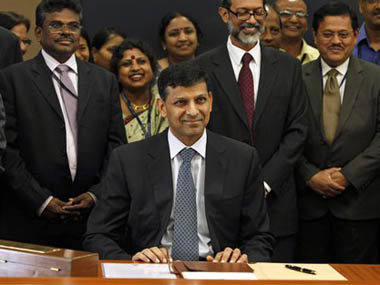The RBI is confident of India’s Current Account Deficit (CAD) coming under control and of the country’s trade numbers being healthy this month, Reserve Bank of India Governor Raghuram Rajan said in an interview with CNBC-TV18 today.
“There is increasingly a sense amongst analysts, amongst commentators that India’s current account deficit (CAD) problem is under control. $70 billion that the government proposed as a CAD after calculating it with us seems now imminently reachable. Some independent analysts are saying it will be even better,” he said.
Rajan also said that turning around investor sentiment to make it positive was the need of the hour and that he is working on it.
The RBI governor said he is pleased to note that some steps have been taken towards that direction in the form of lower outward FDI and higher inwards FDI.
“So the net FDI remains same as previous year,” he said.
[caption id=“attachment_1160397” align=“alignleft” width=“380”]  RBI Governor, Raghuram Rajan. AP[/caption]
In the interview with CNBC-TV18, Rajan spoke about inflation, the rupee, credit growth, foreign investments and the contentious Diwali Bonanza scheme of government.
He said that the government’s move to capitalise public sector banks was taken out of context.
Hailing the move, he said this infusion would lead to lower borrowing costs.
“Better capitalised banks will have low cost of borrowings,” he said.
While the government must encourage savings, it cannot crush consumption totally and hence the government is thinking of adding capital to public sector banks, so that they in turn can lend at lower rates, Rajan explained.
Impact Shorts
More Shorts“Some of these banks will have excess capital and they can then lend to the productive sectors. More efficient banks will merit capital going out and benefit the economy,” Rajan said.
By this move, the government is hoping that lending rates would come down to manageable levels.
Low rates and manageable rates in turn, “will provide a fillip to sectors that are doing poorly - like the durable goods sector” but there was no directive for these loans to go specifically to any one sector. He said that a “lot of the money will anyway go to the production sector”.
“A moderate level of consumption not incompatible (with savings)”, he said.
Saying that the change he sees since 20 September is that there’s more stability in the system.
“Post monetary policy, there was a bit of volatility in the currency, but partly as a result of stabilising external conditions in the internal economy we saw the currency stabilise. Once it is stabilised we decided that we could go to the next step. As we said in the monetary policy statement, every step we take we can also go backwards, we do not intend to do that. It is a two-way process on these liquidity measures,” Rajan said.
The governor also said that he had no intent to change banking licence rules mid-stream, while he agreed that there must be a better resolution for failing banks.
“We need to allow weak banks to fail”, he said.
On being asked about what the nation’s GDP could be, Rajan refrained from giving any number saying, “Our GDP is hostage to many things… hostage to an ephemeral thing called sentiment.”
The new RBI governor said that inflation was reducing slowly and the slowing economy could slow it further.
“The CPI has been coming down slowly. There’s no point putting numbers there. We have to take a measured approach to bring down CPI,” he said, adding, “If economic growth is weak, there is already a disinflationary process on the way.”
He also said that while targeted food subsidies is not a bad thing, it must reach the right people.
“Well targeted food subsidies is not a bad thing. The US spends $80 million a year. We do spend a lot and it doesn’t reach the right people,” Rajan said.
Rajan said that while low inflation and low fiscal deficit are both required to contain CAD, he would like to see lower diesel subsidies which are close to market prices in the future.
Coming back to renewing and reviving investor sentiment he said that we need deeper markets for financing, more Indians selling foreign assets, controlling outward FDI.
While acknowledging that opportunities were returning, he said that some of those had to come from Indian entrepreneurs.


)

)
)
)
)
)
)
)
)



